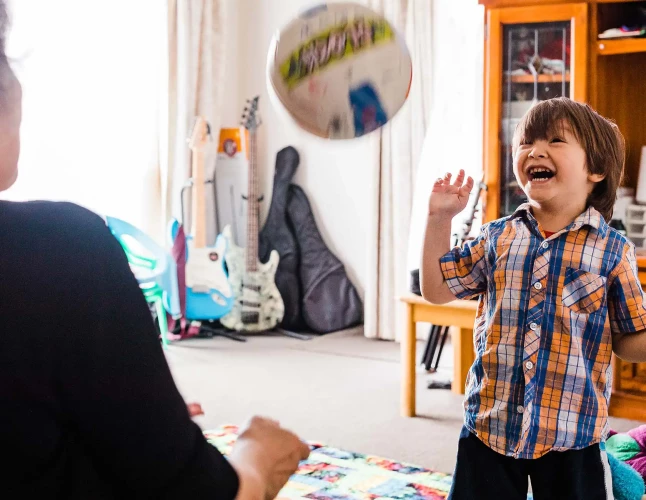
Te ao tākaro The power of play

Play is fun for tamariki, and it's also how they explore and learn about the world.
Play helps us connect with others in a creative and energetic way
Play is special for children. Not only is it fun, but it’s also important for healthy development. It is their ‘work’ and their way of learning about the world. Play is a child’s main job.
Through play, children try out new skills, develop their imagination and creativity, and build relationships with other people in their lives. Play can be an especially powerful bonding time for the whānau and child. Playtime with a child can bring out the best in the parent or caregiver.
The beauty of this learning and growing time is that the motivation for a young child to play is already there — it is enjoyable.
Pou Kōhatu - Stack Stones with us! (transcript)
(Background music: jingle. Video of two young tamariki stacking stones together.)
Tamariki sing waiata while counting how many stones they can stack:
Toru whā
Te tahi o Pipiri
Te rua o Takurua
Te toru here o Pipiri
Te whā o Mahuru
Te rima o Kõpu
Te ono o Whitiānaunau e
Te whitu o Hakihea
Te waru Rehua
English Translation:
The first month of June
The second month of July
The third month of August
The fourth month of September
The fifth month of October
The sixth month of November
The seventh month of December
The eight month of January
(Fades to green background and the words FOR MORE OUTSIDE ADVENTURES VISIT www.sparklers.org.nz/outsideadventures(external link) appear in the middle of the screen above a set logos for S.K.I.P, Department of Conservation and Sparklers).
There is no need for a special ‘playtime’
Doing things together that you enjoy is play.
Play helps to develop a child’s brain. When a young child is playing, they are using all their senses to experience the world. Their brain is developing because brain cells connect up as a result of new and repeated experiences.
When playing games that repeat themselves, like ‘This Little Piggy’ and ‘Incy Wincy Spider’, a toddler is learning about being a partner in a game. They are learning social skills too — how to take turns, join in, and how to imitate what the adult or older sibling is doing.
Anything can be turned into play, including getting dressed, household chores, hanging out the washing, weeding the garden and shopping. Parents can have fun and watch their child learn and grow just by doing everyday things together.





























